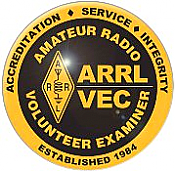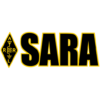Stephen Kinford N8WB, SARA’s VE Team Coordinator, writes:
The final SARA VE test session of 2022 went excellent. We had a great group of VE’s and Helpers, Eric Mast, Phil Costanzo, Jerry Stroup, Doug Hunter, and Bill Knauf. We served 11 people and everyone received what they can to be tested for, 5 TECHS, 4 GENERALS, and 2 EXTRAS. All paperwork has been scanned and uploaded to the ARRL. What a great finish of a great year. Our next session will be in Wayne County in February 2023.

Historically, SARA has offered four exams on a quarterly basis in the tri-county area (confluence of Medina, Summit, and Wayne Counties). In 2022 we expanded to add two additional tests held in Wooster. This was to fill in a geographic gap between our traditional testing locations and the tests done in Mansfield by IARC/W8WE. This expansion was well-received and well-attended.
Currently, SARA has 18 accredited Volunteer Examiners on the roster that are authorized by the FCC and the ARRL to give and score license tests. Additionally, we have a few dedicated volunteers who aren’t accredited but who check in testers, take payment, and “control traffic”. Without all of these people, SARA could not hold the exams, let alone maintain the highest standards and efficiency we strive for.
A huge “THANK YOU” is owed to Stephen Kinford N8WB for all the great work he does leading our VE Team. Additionally, another big “THANK YOU” to all our VEs and volunteers for taking time out of their Saturdays to further the licensing of amateur operators. Additionally, SARA expresses its thanks to the Sharon Center United Methodist Church in Sharon Center, Ohio and the Wayne County Government for donating the use of their facilities for our tests.
If you’ve ever wondered why clubs like SARA test in behalf of the FCC and why license holders are so crucial to the process, here’s a brief history of the current licensing process. This is taken from the ARRL VE Manual, 9th Edition, Chapter 1.
Since the early days of Amateur Radio, there have been several classes of license available to anyone who qualified. To qualify, applicants were required to pass examinations based on Morse code proficiency and knowledge of electronic theory, practice, regulations, and safety as it pertained to Amateur Radio.
Today, the Morse code requirement is gone, but the written examination remains for three classes of license. The three license levels – Technician, General and Amateur Extra classes — continue the tradition of the incentive of additional privileges for additional study and proficiency. It is a system that has withstood the test of time. Prior to today’s volunteer-based examination system, the FCC conducted the testing at its field offices around the country on specified schedules. FCC examiners also traveled to remote locations to provide exams periodically.
But, in the early 1980s, budget cuts took its toll on the FCC’s examination services. FCC exam opportunities shrank, and finally were eliminated. The amateur community would conduct the testing itself, under a new Volunteer Examiner Program drafted by the ARRL with the FCC staff.
In late 1982, the Goldwater-Wirth Bill was passed by Congress and signed into law by President Ronald Reagan. This bill, known as Public Law 97-259, amended the Communications Act of 1934, permitting the FCC to accept the voluntary and uncompensated services of licensed radio amateurs to serve in preparing and administering examinations. It also gave birth to the Volunteer Examiner Coordinator (VEC) program. Volunteer Examiner Coordinators (VECs) were formed in early 1984 to oversee the work of their certified Volunteer Examiners (VEs) and serve as a liaison between the VEs and the FCC.
The ARRL/VEC began coordinating exams in September 1984. With our first exam session held on September 2 at the ARRL Pacific Division Convention in California, the ARRL/VEC was on its way. Since then, the ARRL/VEC has accredited more than 50,000 VEs, who have administered more than 1,250,000 exam elements at more than 90,000 test sessions!
The ARRL is one of a handful of VEC organizations across the country, but it is by far the largest and most preeminent.
